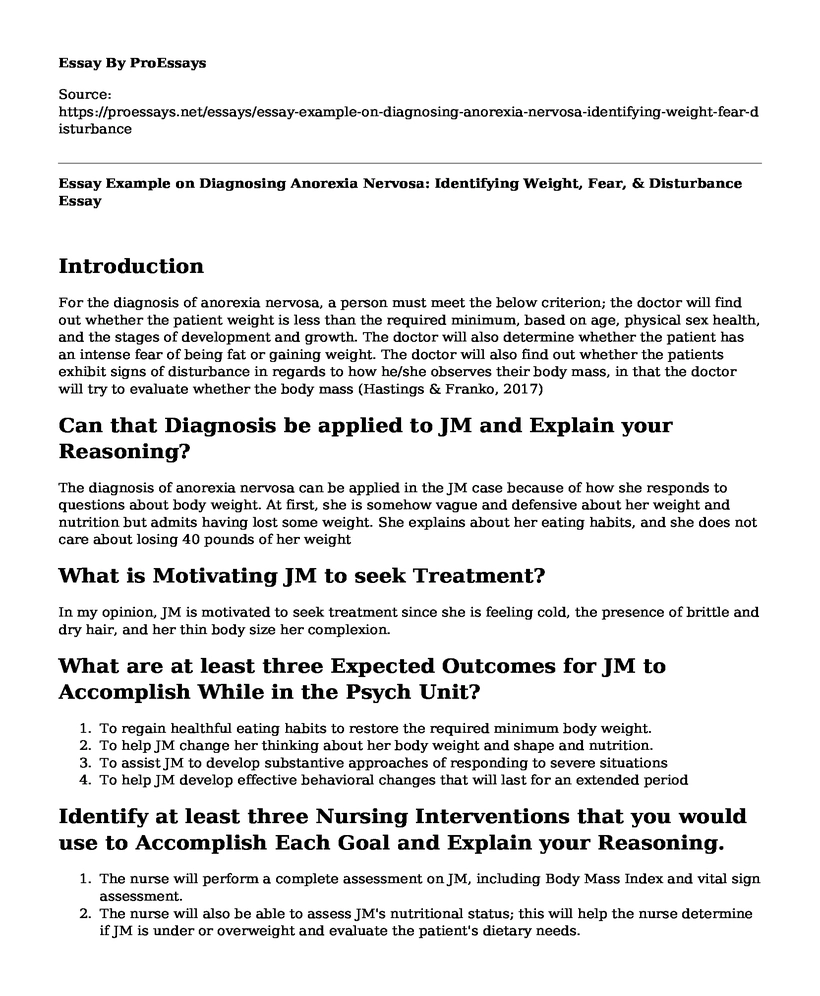Introduction
For the diagnosis of anorexia nervosa, a person must meet the below criterion; the doctor will find out whether the patient weight is less than the required minimum, based on age, physical sex health, and the stages of development and growth. The doctor will also determine whether the patient has an intense fear of being fat or gaining weight. The doctor will also find out whether the patients exhibit signs of disturbance in regards to how he/she observes their body mass, in that the doctor will try to evaluate whether the body mass (Hastings & Franko, 2017)
Can that Diagnosis be applied to JM and Explain your Reasoning?
The diagnosis of anorexia nervosa can be applied in the JM case because of how she responds to questions about body weight. At first, she is somehow vague and defensive about her weight and nutrition but admits having lost some weight. She explains about her eating habits, and she does not care about losing 40 pounds of her weight
What is Motivating JM to seek Treatment?
In my opinion, JM is motivated to seek treatment since she is feeling cold, the presence of brittle and dry hair, and her thin body size her complexion.
What are at least three Expected Outcomes for JM to Accomplish While in the Psych Unit?
- To regain healthful eating habits to restore the required minimum body weight.
- To help JM change her thinking about her body weight and shape and nutrition.
- To assist JM to develop substantive approaches of responding to severe situations
- To help JM develop effective behavioral changes that will last for an extended period
Identify at least three Nursing Interventions that you would use to Accomplish Each Goal and Explain your Reasoning.
- The nurse will perform a complete assessment on JM, including Body Mass Index and vital sign assessment.
- The nurse will also be able to assess JM's nutritional status; this will help the nurse determine if JM is under or overweight and evaluate the patient's dietary needs.
- The nurse will supervise JM during mealtime for a minimum of one hour after taking the meal; this will help the nurse to determine the eating habits of JM.
What will you and the RN Discuss with the Primary Care Provider PCP before any Further Discharge Teaching or Plans?
The following are some of the things that will be discussed before the further discharge of JM. They include; JM is at a high risk of severe anorexia nervosa, JM has not yet gained an in-depth of understanding of the severity of her illness, JM has a high chance of being suicidal and depression, JM is at risk of losing all of her weight that she might have gained (Jelinek, 2017).
You Report JM's Intentions to the PCP. How will the Treatment Plan be altered?The treatment plan will be altered so that she will only be discharged if the symptoms decline. She may also be placed on Cognitive Behavioral Therapy or be placed on medication to reduce symptoms before discharge. She may also be given different precautions regarding suicide.
What Medications would be indicated for JM to assist with the Resolution of both her Anorexia Nervosa and Depression?
There is no proven medication for anorexia nervosa; physicians may only prescribe antidepressants such as SSRIs (Serotonin Reuptake Inhibitors) to reduce depression and anxiety that is common in anorexia. The doctors may also place her on counseling.
What Would Indicate Successful Treatment with JM?
- When she demonstrates reduced symptoms of anorexia nervosa.
- When she that "I am lately feeling a little better."
- When she says "I can now take care of my body weight by eating balanced and enough food"
- When she says, "I feel like now going out with my friends."
- How would you involve The Family in the Treatment Plan?
I will first educate the family members about the ailment, interventions, medications, and treatment. I will also ask the family to support her until the optimal recovery.
Identify at least three Websites that would benefit the Patient and Family as Resources on Eating Disorders.
- www.eatingdisorderhope.com
- www.nationaeatingdisorders.org
- www.beateatingdisorders.org.uk
- www.healthline.com
- www.anred.com
References
Campbell, I. C., Mill, J., Uher, R., & Schmidt, U. (2011). Eating disorders, gene–environment interactions and epigenetics. Neuroscience & Biobehavioral Reviews, 35(3), 784-793.
Eddy, K. T., Tabri, N., Thomas, J. J., Murray, H. B., Keshaviah, A., Hastings, E., ... & Franko, D. L. (2017). Recovery From Anorexia Nervosa and Bulimia Nervosa at 22-Year Follow-Up. The Journal of clinical psychiatry, 78(2), 184-189.https://europepmc.org/abstract/med/28002660
Eisler, I., Simic, M., Hodsoll, J., Asen, E., Berelowitz, M., Connan, F., ... & Yi, I. (2016). A pragmatic randomised multi-centre trial of multifamily and single family therapy for adolescent anorexia nervosa. BMC psychiatry, 16(1), 422. https://bmcpsychiatry.biomedcentral.com/articles/10.1186/s12888-016-1129-6
Jelinek, H. F., Cornforth, D. J., Tarvainen, M. P., Spence, I., & Russell, J. (2017). Decreased Sample Entropy to Orthostatic Challenge in Anorexia Nervosa. J Metabolic Synd, 6(226), 2167-0943.https://pdfs.semanticscholar.org/0f56/654f984c527217b2ec8657b2f021d7b568d4.pdf
Cite this page
Essay Example on Diagnosing Anorexia Nervosa: Identifying Weight, Fear, & Disturbance. (2023, Sep 07). Retrieved from https://proessays.net/essays/essay-example-on-diagnosing-anorexia-nervosa-identifying-weight-fear-disturbance
If you are the original author of this essay and no longer wish to have it published on the ProEssays website, please click below to request its removal:
- Research Proposal on the Issue of Decreasing Emergency Room Wait Time
- Children Mental Health Essay
- What Can Nursing Homes Do to Foster Healthy Sexual Expressions Among Residents?
- 3-Step Approach to Counseling Patients w/ Sexual Dysfunction Concerns - Essay Sample
- Conflict Management in Nursing: Strategies for Leaders - Essay Sample
- The Passion of Nursing: From ADN to FNP - Essay Sample
- Essay Example on Crew Resource Management: Prioritizing Patient Safety & Clinical Success







